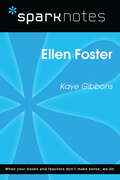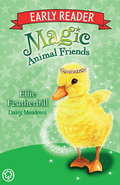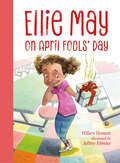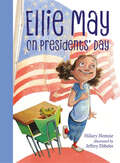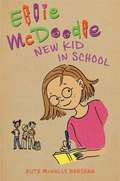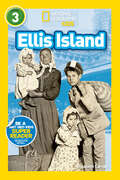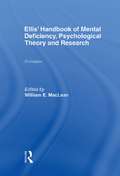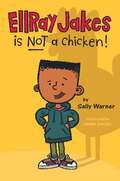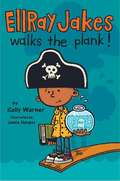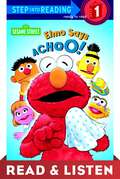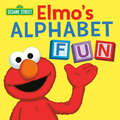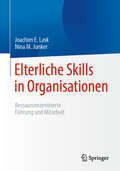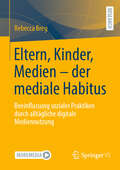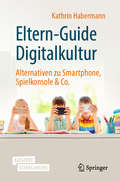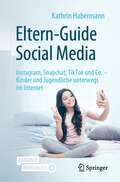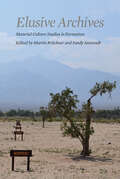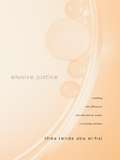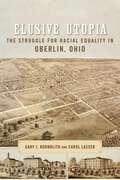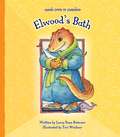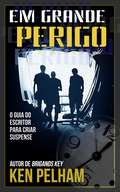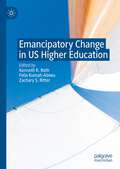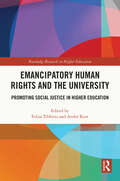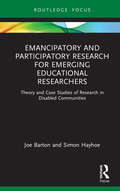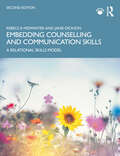- Table View
- List View
Ellen Foster (SparkNotes Literature Guide Series)
by SparkNotesEllen Foster (SparkNotes Literature Guide) by Kaye Gibbons Making the reading experience fun! Created by Harvard students for students everywhere, SparkNotes is a new breed of study guide: smarter, better, faster.Geared to what today's students need to know, SparkNotes provides:chapter-by-chapter analysis explanations of key themes, motifs, and symbols a review quiz and essay topics Lively and accessible, these guides are perfect for late-night studying and writing papers.
Ellie Brader Hates Mr. G.
by Janet JohnstonMy Favorite Teacher Just Ruined My Whole Year! She didn't mean to, of course. I mean, it wasn't Ms. Simpson's fault her mother got sick and she had to leave. It's just that then we were stuck with Mr. Garrett. He was about as old as a Tyrannosaurus Rex, and almost as mean. He kept changing the rules about everything--even who'd get to keep Bingo, our class rabbit, at the end of the year. It just wasn't fair! Too bad kids can't divorce their teachers! Instead, I was just trying to stay out of Mr. G.'s way until the end of the year. Maybe he'd hardly even notice me. But then some really weird things--some really awful things--happened. And I found out that even a mean old dinosaur doesn't have to be scary. Who knows? With a little luck, I might even survive fifth grade!
Ellie Featherbill: Book 3 (Magic Animal Friends Early Reader #3)
by Daisy MeadowsWelcome to a magical world where animals talk and play - just like you and me!Best friends Jess and Lily love all animals. But when they follow a mysterious golden cat into Friendship Forest - a place where animals live in tiny cottages and sip dandelion tea at the Toadstool Cafe - their animal friends suddenly become much more magical!On their first adventure in Friendship Forest, can the two friends rescue adorable baby bunny Lucy Longwhiskers from the wicked witch Grizelda?
Ellie May on April Fools' Day: An Ellie May Adventure (Ellie May #2)
by Hillary HomzieHow far will Ellie May go for a laugh--and a little revenge--when her class is allowed to celebrate April Fools' Day?Quirky and funny second grader Ellie May can't believe her class is allowed to celebrate April Fools' Day--so long as it's done in good fun. She absolutely loves the idea of targeting a certain someone--the practically perfect Ava. Practicing on her parents and sisters, Ellie May begins to brainstorm harmless pranks. Soon enough, good intentions turn the classroom and her home upside-down when fake ants, trick tape, and hidden surprises don't go as planned. Ellie May may not be perfect like Miss-Know-it-All Ava, or calm and rational like her best friend Lizzy, but she's good-hearted and eventually realizes that the best trick is to make friends genuinely laugh--at no one's expense.
Ellie May on Presidents' Day: An Ellie May Adventure (Ellie May #1)
by Hillary HomzieJust how far will Ellie May go to be chosen as class flag leader during the exciting week leading up to Presidents' Day?Quirky and funny, second-grader Ellie May enjoys learning about US presidents. But she absolutely loves the idea of being class flag leader during the week before Presidents' Day. Tired of not being chosen to hold the flag, she makes it her mission to finally get picked. Along the way, Ellie May ends up karate chopping the class plant when she tries to determine whether George Washington actually chopped down that cherry tree. Next she takes apart the class pencil sharpener when she learns that Abraham Lincoln liked learning how gadgets work. Ellie May may not be perfect like Miss-Know-it-All Ava or calm like her best friend Lizzy, but she's good-hearted and eventually realizes that honesty and patience go a long way.
Ellie McDoodle: New Kid in School
by Ruth BarshawEllie writes and doodles in a journal of her family's move to a new home and her struggle to make friends, which gets a lot easier as leads a nonviolent protest of long lunch lines at school.
Ellis Island (Readers)
by Elizabeth CarneyExplore the history of Ellis Island, one of the most recognized landmarks in American history. Kids will learn about its early history as a Mohegan island and rest spot for fishermen through its time as a famous immigration station to today's museum. The level 3 text provides accessible, yet wide-ranging, information for independent readers.
Ellis' Handbook of Mental Deficiency, Psychological Theory and Research
by Jr. William E. MacLeanIn the 16 years since the publication of the second edition of this volume, psychological theory and research in mental retardation has continued to expand and extend scientific, theoretical, and clinical understanding of this most complex and challenging human condition. Explicit effort has been made to translate theory and research into useful and efficacious assessment, intervention, prevention, and policy actions. This third edition provides an opportunity to critique major conceptual developments and empirical research in an effort to stimulate further behavioral research of practical, social importance. The Handbook presents work by prominent contributors to a major scientific endeavor that has grown dramatically during the last three decades. The challenge for each author was to identify important theoretical and empirical issues, provide a critical, selective review of exemplary research, and discuss the questions that remain unanswered in each area. In short, the goal for this third edition was to consolidate the knowledge gained during the past 30 years and to present a blueprint for future research in mental retardation, the broader field of learning disabilities, and other developmental disorders such as autism. Providing totally different coverage and direction from the previous edition, this text fills a crucial instructional need in graduate courses related to the psychology of mental retardation. With its emphasis on psychological research and theory, it offers an important alternative to many available texts that primarily emphasize the application of research.
Ellray Jakes Is Not a Chicken (Ellray Jakes #1)
by Sally WarnerEight-year-old EllRay Jakes is sick of getting picked on. But every time he tries to defend himself against class bully Jared Matthews, EllRay is the one who winds up in trouble. It's just not fair! Then his dad offers him a deal: If EllRay can stay out of trouble for a week, they'll go to Disneyland! But being good for one whole week is not so easy. . . . This humorous and true-to-life story kicks off the EllRay series, which is just right for boys (and girls!) who are beginning to read chapter books.
Ellray Jakes Walks the Plank (Ellray Jakes #3)
by Sally WarnerDead goldfish + bossy girls = big trouble! Things are going just swimmingly for EllRay. He's getting along with most of the kids at school. He's even getting along with his family. But then everything comes screeching to a halt when his younger sister accidentally overfeeds Zip, the classroom goldfish that EllRay was taking care of over spring vacation. Zip is a goner. What is EllRay going to tell the kids in his third-grade class? Fortunately, most of them are sympathetic. But not bossy Cynthia. She sees this as an opportunity to blame EllRay for her own mess-ups. Must EllRay now walk the plank for stuff that he didn't do?
Elmo Says Achoo! (Step into Reading)
by Sarah AlbeeElmo's bringing a present to Oscar in this silly story enhanced with audio narration by Bob McGrath from Sesame Street. But the mysterious wrapped gift has a curious effect—it's making Elmo sneeze! And every time Elmo sneezes, something funny happens. The youngest readers will love following along as Elmo's sneezes cause laundry to fall off a line and much more in this Early Step into Reading™ storyThis ebook includes Read & Listen audio narration.
Elmo's Alphabet Fun (Pictureback(R))
by Jennifer LibertsIt's Alphabet Day at school, and Elmo is ready to learn his letters! This paperback picture book includes Sesame Street stickers for each letter of the alphabet!Elmo, Abby, Julia, and other Sesame Street friends are extra excited for school because today is Alphabet Day. Their preschool teacher has them singing the ABC song, decorating letters, and playing a fun alphabet game! Young children will love learning their letters with Elmo.Sesame Workshop, the nonprofit educational organization behind Sesame Street, aims to help kids grow smarter, stronger, and kinder through its many unique domestic and international initiatives. These projects cover a wide array of topics for families around the world. Sesame Street is the most trusted name in early learning.
Elterliche Skills in Organisationen: Ressourcenzentrierte Führung und Mitarbeit
by Joachim E. Lask Nina M. JunkerElterliche Skills in Organisationen - Ressourcenzentrierte Führung und Mitarbeit Basierend auf aktuellen wissenschaftlichen Erkenntnissen verdeutlicht „Elterliche Skills in Organisationen“, wie sich Organisationen und jeder Einzelne die aus der Elternrolle erworbenen Kompetenzen ressourcenorientiert nutzbar machen können. Denn es ist nachgewiesen, dass zahlreiche Ähnlichkeiten zwischen der Elternrolle und der Rolle als Mitarbeitende und Führungskräfte bestehen. Dadurch kann beachtlicher gegenseitiger Kompetenzerwerb ermöglicht werden. Wie dies möglich ist, welche Skills für Führungskräfte besonders relevant sind und wie der positive Transfer der Kompetenzen aus der Elternrolle unterstützt und für die Tätigkeit im Unternehmen noch besser eingesetzt werden kann, erfahren Sie in diesem Buch. Zielgruppen: Führungskräfte, HRM-Fachleute, Coaches, TrainerInnen, PsychologInnen, WirtschaftswissenschaftlerInnen, sowie Eltern. Zu den Autoren: Dipl.-Psych. Joachim E. Lask, Wirtschafts- und Familien-Psychologe und Leiter des WorkFamily-Instituts, berät Organisationen und forscht zum Work-Family Enrichment. Dr. Nina M. Junker, Associate Professor an der University of Oslo, ist Arbeits- und Organisationspsychologin. Sie forscht und publiziert unter Berücksichtigung sozialpsychologischer Konzepte seit vielen Jahren zur Schnittstelle von Beruf und Privatleben.
Eltern, Kinder, Medien - der mediale Habitus: Beeinflussung sozialer Praktiken durch alltägliche digitale Mediennutzung
by Rebecca BregIn diesem Buch wird das Mediennutzungsverhalten von Heranwachsenden (11–15 Jahre) im Zusammenhang mit sozialer Herkunft und habituellen Mustern empirisch untersucht. Mithilfe von Fragebögen und Interviews wird die digitale Mediennutzung von Schüler*innen an Mittelschulen und Gymnasien verglichen. Die Ergebnisse zeigen, dass mediale Praktiken durch familiäre Strukturen, das soziale Umfeld und kulturelles Kapital beeinflusst werden. Die Untersuchung hebt Unterschiede im digitalen Nutzungsverhalten hervor, die sich in Zugangsmöglichkeiten, elterlicher Begleitung und der Mediennutzung im Alltag zeigen. Während Schüler*innen aus privilegierten Verhältnissen digitale Medien gezielt für Schule und Freizeit nutzen, steht bei sozioökonomisch schwächeren Heranwachsenden oft die Unterhaltung im Vordergrund. Das Konzept des Habitus zeigt, wie soziale Praktiken die Mediennutzung prägen. Digitale Medien sind eng mit sozioökonomischen Strukturen verknüpft. Das Buch liefert wertvolle Erkenntnisse für Eltern, Pädagog*innen und politische Entscheidungsträger*innen, um digitale Kompetenz und Chancengleichheit nachhaltig zu fördern.
Eltern-Guide Digitalkultur: Alternativen zu Smartphone, Spielkonsole & Co.
by Kathrin HabermannDieser Ratgeber hilft Eltern, mit der allgegenwärtigen Präsenz von Smartphone, Tablet und Co. gelassen und kreativ umzugehen. Erfahren Sie, weshalb Smartphones gerade Ihre Kinder magisch anziehen, wie wichtig Langeweile für die Entwicklung Ihres Kindes ist und welche Auswirkungen der Medienkonsum auf die Gehirnentwicklung hat. Dieses Buch zeigt Ihnen zahlreiche spannende und gleichzeitig entwicklungsfördernde Alternativen zum Medienkonsum, die Sie täglich anbieten können. Praxistipps für herausfordernde Situationen wie der Restaurantbesuch, lange Autofahrten oder die fünfstündige Bahnfahrt: Mit dieser Lektüre sind Sie optimal gerüstet.Plus:• Wissenschaftliche Hintergründe und aktuelle Studien übersichtlich und verständlich aufbereitet• Fragebögen und Checklisten zur Ermittlung des Medienkonsums• Material- und Spiellisten, Mediennutzungsvertrag u.v.m. zum Download und als Kopiervorlage
Eltern-Guide Social Media: Instagram, Snapchat, TikTok und Co. – Kinder und Jugendliche unterwegs im Internet
by Kathrin HabermannDieser Ratgeber verschafft Eltern einen Einblick in die Welt von TikTok, Instagram, Facebook, Twitter und Co. und erklärt, welche Chancen und Gefahren das Internet für ihren Nachwuchs birgt. Welche Plattformen sind auf dem Markt und wie funktionieren sie? Worauf sollte ich achten, wenn mein Kind beginnt, in Onlineshops zu bestellen? Wie sieht die gelungene Anleitung zum Umgang mit modernen Medien im Idealfall aus? Erfahren Sie, was Kinder und Jugendliche selbst über den Medienkonsum denken und wie viel Medienkompetenz heute wirklich notwendig ist, um gesellschaftlich und beruflich nicht abgehängt zu werden.Aus dem Inhalt:• Auswirkungen digitaler Medien auf Gehirnentwicklung, Konzentration und Suchtverhalten• Einsatz digitaler Medien in Schulen• Chancen und Risiken von Social Media und Gaming, Onlinehandel und Datenschutz• Richtlinien zur gesunden Screentime und Anlaufstellen für ElternKlären Sie sich und Ihren Nachwuchs auf und verhelfen Sie ihren Kindern zu verantwortungsvollem Handeln im Internet.
Elusive Archives: Material Culture in Formation (Material Culture Perspectives)
by Oliver Scheiding Wendy Bellion Bernard L. Herman Julian Yates Sarah Wasserman Alexander Lawrence Ames Torsten Cress Julie L. McGee Cindy Ott Laura E. Helton Jennifer Van Horn Kiersten Thamm Alexandra Ward Halina Adams Rosalie Hooper Spencer Wigmore Catherine Morrissey Michelle Everidge Kaila T. Schedeen Lu Ann Cunzo Natalie Elizabeth Wright J. Ritchie Garrison Jesse Kraft Michael J. Emmons Jessica ConradThe essays that comprise Elusive Archives raise a common question: how do we study material culture when the objects of study are transient, evanescent, dispersed or subjective? Such things resist the taxonomic protocols that institutions, such as museums and archives, rely on to channel their acquisitions into meaningful collections. What holds these disparate things together here are the questions authors ask of them. Each essay creates by means of its method a provisional collection of things, an elusive archive. Scattered matter then becomes fixed within each author’s analytical framework rather than within the walls of an archive’s reading room or in cases along a museum corridor. This book follows the ways in which objects may be identified, gathered, arranged, conceptualized and even displayed rather than by “discovering” artifacts in an archive and then asking how they came to be there. The authors approach material culture outside the traditional bounds of learning about the past. Their essays are varied not only in subject matter but also in narrative format and conceptual reach, making the volume accessible and easy to navigate for a quick reference or, if read straight through, build toward a new way to think about material culture.
Elusive Justice: Wrestling with Difference and Educational Equity in Everyday Practice (Teaching/Learning Social Justice)
by Thea Renda Abu El-HajElusive Justice addresses how educators think about and act upon, differences in schools - be they based on race, gender, class, or disability - and how discourse and practice about such differences are intimately bound up with educational justice. Rather than skip over contentious or uncomfortable dialogues about difference, Thea Abu El-Haj tackles them head on. Through rich and detailed ethnographic portraits of two schools with a commitment to social justice, she analyzes the ways discourses about difference provide a key site for both producing and resisting inequalities, and examines the dilemmas that emerge from either focusing on or ignoring them. In interrogating fundamental assumptions about difference and equity, Abu El-Haj deftly blends critique with a search for hope and possibility, to ultimately argue for ways educators might translate ideals about justice into effective practice.
Elusive Utopia: The Struggle for Racial Equality in Oberlin, Ohio (Antislavery, Abolition, and the Atlantic World)
by Edward Bartlett Rugemer Gary Kornblith Richard J. Blackett Carol LasserBefore the Civil War, Oberlin, Ohio, stood in the vanguard of the abolition and black freedom movements. The community, including co-founded Oberlin College, strove to end slavery and establish full equality for all. Yet, in the half-century after the Union victory, Oberlin’s resolute stand for racial justice eroded as race-based discrimination pressed down on its African American citizens. In Elusive Utopia, noted historians Gary J. Kornblith and Carol Lasser tell the story of how, in the nineteenth and early twentieth centuries, Oberlin residents, black and white, understood and acted upon their changing perceptions of race, ultimately resulting in the imposition of a color line.Founded as a utopian experiment in 1833, Oberlin embraced radical racial egalitarianism in its formative years. By the eve of the Civil War, when 20 percent of its local population was black, the community modeled progressive racial relations that, while imperfect, shone as strikingly more advanced than in either the American South or North. Emancipation and the passage of the Civil War amendments seemed to confirm Oberlin's egalitarian values. Yet, contrary to the expectations of its idealistic founders, Oberlin’s residents of color fell increasingly behind their white peers economically in the years after the war. Moreover, leaders of the white-dominated temperance movement conflated class, color, and respectability, resulting in stigmatization of black residents. Over time, many white Oberlinians came to view black poverty as the result of personal failings, practiced residential segregation, endorsed racially differentiated education in public schools, and excluded people of color from local government. By 1920, Oberlin’s racial utopian vision had dissipated, leaving the community to join the racist mainstream of American society.Drawing from newspapers, pamphlets, organizational records, memoirs, census materials and tax lists, Elusive Utopia traces the rise and fall of Oberlin's idealistic vision and commitment to racial equality in a pivotal era in American history.
Elwood's Bath
by Larry Dane BrimnerYoung Elwood prepares for bathtime as he adds his favorite playmates, including eight large elephants, to the water.
Em Grande Perigo - O Guia do Escritor para Criar Suspense
by Ken Pelham João WolfAprenda as dicas, truques e técnicas para criar e manter o suspense na ficção. Por que alguns romances prendem tanto o leitor, que é impossível parar de virar as páginas uma após a outra, enquanto outros fazem o leitor se arrastar por elas? O que esses livros tem de especial? Em uma palavra: suspense. O escritor chama você, prende você e depois o solta. Mas como? Não é por acidente. Aprenda as dicas, truques e técnicas para criar suspense na ficção, e até mesmo na não-ficção. Neste conciso guia, você irá aprender o que faz o suspense acontecer, por que gostamos dele, e como saber utilizá-lo em seus escritos. Gênero: Educação e Referência Gênero Secundário: Mistério, Thriller e Suspense Idioma Original: Inglês Número de Palavras: 11,770 Informações: Eu possuo oito livros disponíveis online para venda no formato de ebooks e também como livros de bolso, e dois mais ainda no forno. Meu primeiro romance, o thriller de suspense Brigands Key, foi publicado comercialmente em 2012 e já teve mais de 7,000 exemplares vendidos ou baixados. Este livro, Em Grande Perigo, foi publicado no verão de 2014. Com frequencia eu dou palestras sobre o tema de como criar e manter o suspense. Trecho do livro: Suspense... Mas que Diabos É Isso? Todo mundo tem uma ideia do que seja o suspense, mas o que é isso exatamente? O que causa o suspense? E, mais importante para os escritores, como podemos usá-lo a nosso favor? Pra começar, o dicionário Merriam-Webster nos dá uma definição. Suspense (substantivo): um sentimento ou estado de nervosismo ou excitação causado pela imaginação do que irá acontecer. É até bem simples. Mas não significa muita coisa, realmente. É correto dizer que o suspense é uma forma de incerteza. Além disso, o suspense está vinculado ao medo. Apesar de não serem a mesma coisa, existe
Emancipatory Change in US Higher Education
by Zachary S. Ritter Kenneth R. Roth Felix Kumah-AbiwuThis edited volume explores and deconstructs the possibilities of higher education beyond its initial purpose. The book contextualizes and argues for a more robust interrogation of persistent patterns of campus inequality driven by rapid demographic change, reduced public spending in higher education, and an increasingly polarized political landscape. It offers contemporary views and critiques ideas and practices such as micro-aggressions, implicit and explicit bias, and their consequences in reifying racial and gender-based inequalities on members of nondominant groups. The book also highlights coping mechanisms and resistance strategies that have enabled members of nondominant groups to contest primarily racial- and gender- based inequity. In doing so, it identifies new ways higher education can do what it professes to do better, in all ways, from providing real benefit to students and communities, while also setting a bar for society to more effectively realize its stated purpose and creed.
Emancipatory Human Rights and the University: Promoting Social Justice in Higher Education (Routledge Research in Higher Education)
by André Keet Felisa TibbittsThis volume explores the application of human rights to higher education through a critical lens. Combining theoretical and applied perspectives, it asks what a human rights framework grounded in liberation and justice can offer to ways of working and teaching practices in higher education. Human rights, in this edited compilation, call for continuous critical engagements around the higher education transformation project. The book recognizes human rights simultaneously as law, values, and emancipatory vision. It showcases global north and global south perspectives and encourages a dialogue between the human rights approach and other approaches to higher education transformation, such as decolonialization, anti-racism, diversity and inclusion, and intersectionality. Individual chapters featuring a range of case studies written from global south and north perspectives critically examine higher education practices linked with human rights, ranging from curricular practices to student activism and community partnerships. The critical space of the university and its role in the transformation of society is therefore viewed in multi-dimensional ways. Underlining the value of applying human rights as a framework in understanding and designing higher education transformation, the book will be of great interest to scholars, researchers, and post-graduate students in the fields of the sociology of education, human rights education, higher education, and social justice education
Emancipatory and Participatory Research for Emerging Educational Researchers: Theory and Case Studies of Research in Disabled Communities (Qualitative and Visual Methodologies in Educational Research)
by Simon Hayhoe Joe BartonEmancipatory and Participatory Research for Emerging Educational Researchers is a concise fundamental guide on two related models of education research—emancipatory and participatory. In addition to providing an introduction to these research models, this book also studies them through the lens of critical practice as well as pure research and provides case studies as examples. It highlights a variety of data collection techniques that are used in education research, from visual methods to interviews, and the strategies researchers apply to ensure the research process involves and benefits the participants. Emancipatory and Participatory Research for Emerging Educational Researchers functions as a useful "how-to" guide for first-time and less experienced researchers. Furthermore, it highlights not only how participatory research is by its nature emancipatory but also the overlaps between the two models’ approach to data collection.
Embedding Counselling and Communication Skills: A Relational Skills Model
by Rebecca Midwinter Janie DicksonEmbedding Counselling and Communication Skills provides a step-by-step approach for those looking to gain a theoretical and practical understanding of using counselling and communication skills within the helper role and applying these skills in the context of professional practice.This revised edition is brought up to date with new content around the subjects of working online, working across difference and diversity, coaching, grief and loss and managing challenging situations. Written in a clear and accessible teaching style, this book progresses through the ‘initial helper’ communication skills that are used in everyday life, to the more complex and in-depth counselling skills required in a helper relationship. It introduces the reader to a Relational Skills model which demonstrates the phases of relationship development. The authors show what happens within each phase and identify how and when to use skills appropriately. Knowledge of reflective practice, aspects of the relationship and how to manage change ensures the text considers the full range of general and specific skills and abilities required. Learning is brought alive through the use of online video clip sessions of a real helper/client relationship giving the reader opportunities and encouragement to reflect and evaluate their learning.This book will be an essential resource for students taking an introductory counselling skills course, other trainees within the mental health sector, coaches and many other qualified professionals who wish to enhance their knowledge of embedding counselling skills into their work and practice.
